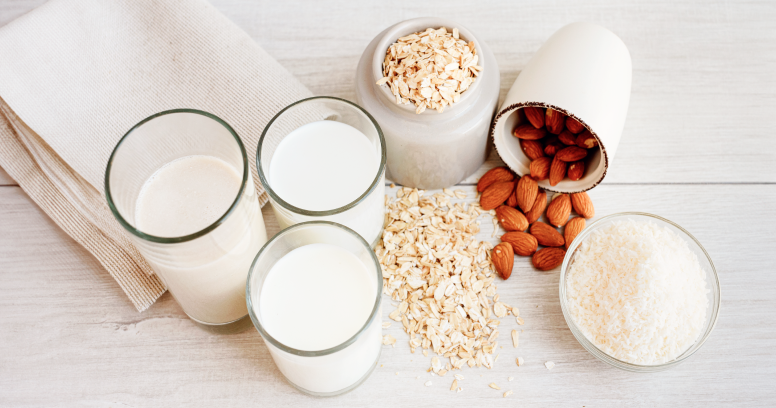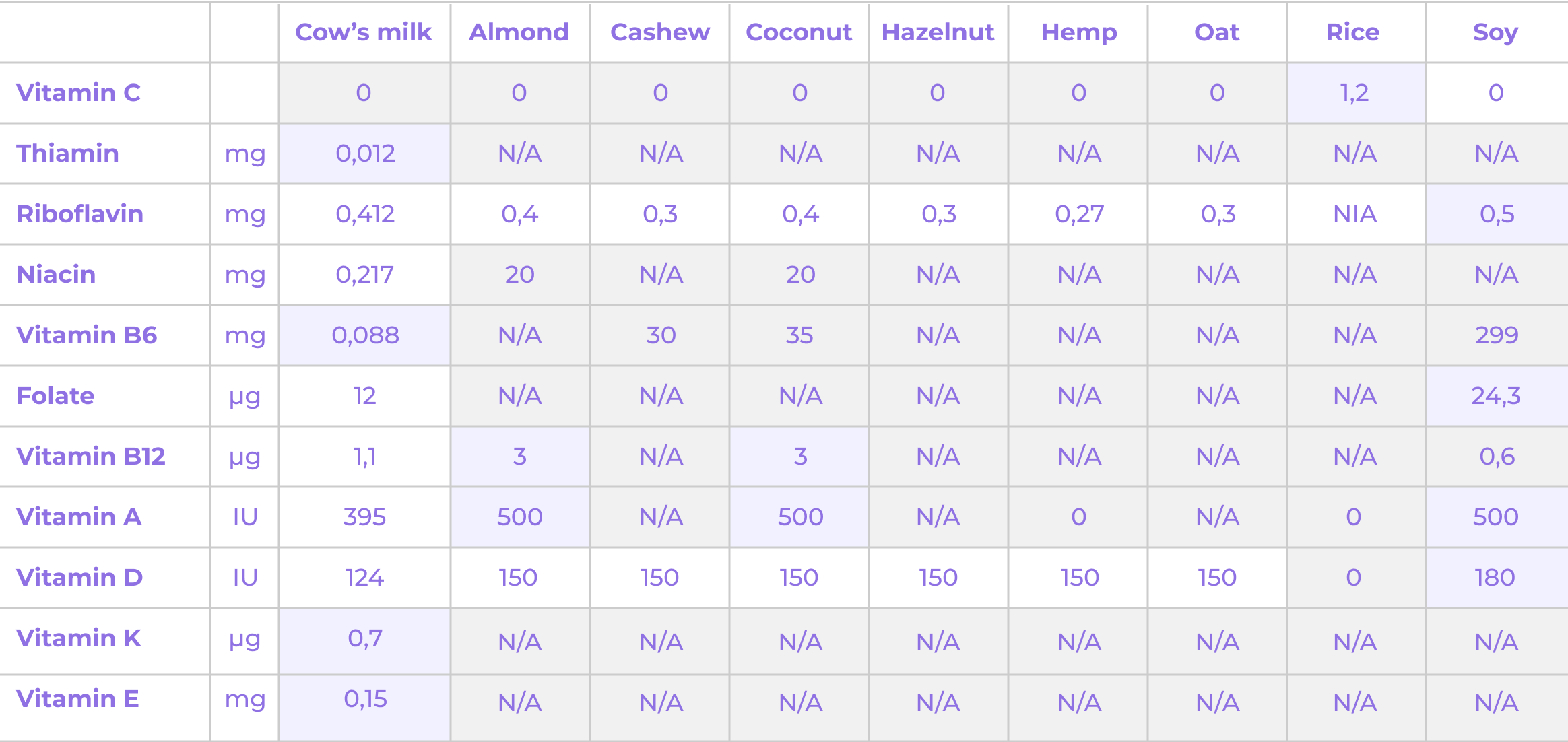Which milk is the healthiest for you?

Milk has been a staple for humans for thousands of years, and there’s evidence that we started drinking it even before we could digest it well.[1] (That period of evolution as we were developing the genes to digest dairy was probably a little … unpleasant.)

No doubt you grew up with milk on your table. But have you noticed the new players in the milk game?
The dairy case used to contain cow’s milk exclusively, but now you’ll see a wide variety of milk made from nuts, seeds, beans, and grains. These can be great alternatives for people who can’t tolerate dairy or just want other options.
In this article, we’ll walk you through the pros and cons to help you choose the type of milk that might be right for your needs and goals.
Plus, toward the end of this article, we’ll share a side-by-side comparison of specific nutrients in various milk types.
Unsure about your dairy intake? Try the Simple quiz to get personalized insights. Plus, with our food tracker, you can track how different milk types affect you over time. Dive into a more comprehensive approach to your health.
Cow’s milk
If you’re old enough, you may remember the 1980s ad campaign: Milk does a body good. Milk’s high protein, vitamin, and mineral content may indeed help you build stronger bones and muscles, but cow’s milk may not be the right milk for everyone.
Pros
Cow’s milk contains eight grams of protein per one-cup serving and is a source of calcium, potassium, and vitamin B12. Most cow’s milk is fortified with vitamins A and D to keep your bones healthy and support optimal growth.
Are you concerned about the fat in milk and wondering if it might increase your risk of heart disease? The latest research on the subject shows that fat in cow’s milk doesn’t seem to be associated with heart disease development.[2,3] That said, with skim and low-fat dairy available, fat content may not be an issue.
Thanks to its protein and nutrient content, milk is often used as a cheap, easily available recovery drink for athletes.[4]
Cons
Research on cow’s milk and body weight doesn’t seem to show that consuming milk contributes to weight gain per se.[5]
For many people, the biggest issue with milk is tolerance.
For example, you might have trouble digesting one of the sugars found in cow’s milk, known as lactose. When you’re young, your body produces an enzyme called lactase to help you digest lactose.
But as we age, our bodies often make less of this enzyme, and you can develop a lactose intolerance.[6] If you suffer from bloating, gas, or stomach cramps after drinking cow’s milk, you might have an intolerance. You’ll need to choose “lactose-free” milk with added lactase enzyme or try plant-based milk instead.
Some people may also be sensitive to the proteins in milk and find that they either have an immediate allergic reaction or a more delayed immune response, such as a skin rash an hour or two later.[7,8]
Honorable mention: Other animal milks
Cows aren’t the only animal milk game in town. Depending on where you live, you might also see goat, sheep, yak, buffalo, donkey, or even camel milk and milk products (like cheese or yogurt).[9–16]
These vary somewhat in their nutritional value and taste but are generally similar.
Plant-based milks

Plant-based “milks” have become more popular as they provide different tastes and nutrients than regular cow’s milk. In the last few years, milk alternatives have exploded on the market, giving you many more options to choose from.
You can find many varieties of plant-based milk, including almond, soy, or oat milk. Plant-based milk has different health benefits depending on the ingredients. These options are great if you’re vegan, lactose-intolerant, or prefer the taste of alternative milk options.
You might see these plant-based milks labeled as “mylk” to clearly distinguish them from cow’s milk.
Nut milk
Nearly any nut or seed — such as almonds, cashews, peanuts, or hazelnuts — can be used to make plant-based milk.
You can make your own nut milk at home by blending nuts with water and then straining away the solids to create a creamy, flavorful liquid that’s similar to cow’s milk in appearance and texture.
Commercial versions might contain extra ingredients such as vitamin D and calcium for fortification or food additives like guar gum or carrageenan for improved texture or taste.
Nut milk is vegan and lactose-free.
Pros
Nut milk is much lower in carbohydrates and sugar than cow’s milk. Unsweetened varieties usually contain less than one gram of carbohydrate per serving and are sugar-free. You also save calories when swapping cow’s milk for nut milk.
Almond milk provides extra fat-soluble vitamins like vitamin E, and store-bought nut milk is usually fortified with vitamins and minerals to help you reach your daily nutrient requirements.
Cons
Nut milk is usually much lower in protein, containing around one gram of protein or less per serving. However, new varieties on the market have recently added plant protein from peas to help you get more protein from your plant-based milk.
You should definitely check the label when you purchase nut milk. Look for added sugars or other additives you may want to avoid. A glance at the ingredient list can help you avoid unwanted ingredients and make the best brand selection.
And obviously, if you have nut allergies — avoid this.

Soy milk
Soy milk is one of the most popular milk alternatives because of its naturally sweet flavor and higher protein content. It’s made by combining soybean flour and water.
Pros
Soy milk contains nearly as much protein per serving as cow’s milk and has the highest protein content of all plant-based milk. Soy protein is a “complete protein,” meaning it contains all nine essential amino acids. If you’re vegan, you may want to consider soy milk as a way to help you get more protein in your meals.
Unsweetened soy milk is lower in carbohydrates than cow’s milk and contains healthy unsaturated fats and isoflavones that are linked to lower risks of cardiovascular disease.[17]
Soy milk is a natural source of vitamin A, potassium, and calcium. Fortified soy milk will provide additional calcium and vitamin D.
Cons
Like nut milk, many soy milk varieties contain sugar, emulsifiers, gums, or other additives to improve taste and texture. Read labels to help you make an informed purchase.
If you’re allergic or sensitive to soy, avoid soy milk.
Honorable mention: Pea milk
Like soy milk, pea milk is made from legumes, which are higher in protein. If you want a higher-protein choice but can’t tolerate soy, pea milk might be an option.
Coconut milk

Coconut milk is made from coconuts, and it can come in several varieties.
“Coconut milk” or “coconut cream” are higher-fat versions, much like whipping cream, that are used to thicken and add richness to recipes like Thai or Indian curries. People on keto diets often choose these in recipes like smoothies.
However, there are now also lighter, lower-fat coconut-based milks on the market that can be used like cow’s milk.
Pros
Many people like the naturally sweet and rich taste of coconuts, and coconut-based milk goes well in things like coffee drinks.
Cons
Higher-fat coconut milk contains a lot of calories, which can lead to weight gain if people consume too much. These are delicious, creamy, and easy to over-consume.
Higher-fat coconut milks — especially those with emulsifiers like carrageenan or guar gum — can also cause digestive problems such as bloating, diarrhea, and constipation if over-consumed.
With lower-fat versions, manufacturers might also add sugar, emulsifiers, gums, or other additives to improve taste and texture. Read labels to help you make an informed purchase.
If you’re allergic or sensitive to coconut, avoid coconut milk.
Hemp milk
You can make hemp milk by blending hemp seeds with water.
While hemp seeds are the seeds of the hemp plant, Cannabis sativa, don’t worry; hemp seeds don’t contain THC, the psychoactive ingredient in cannabis.[19] You won’t get “high” or fail a drug test if you drink hemp milk.
Pros
Hemp seeds create milk rich in omega-3 fats, iron, vitamin E, and other beneficial nutrients. Hemp milk contains some protein (about 2 to 5 grams per serving, depending on the milk brand) and doesn’t contain any carbohydrates.
The combination of healthy fats and protein can make hemp milk a filling beverage — a great option if you’re trying to lose weight or eat fewer carbohydrates.
Cons
Hemp milk has a stronger flavor, which you may not enjoy. If you don’t like the taste of hemp seeds, this milk may not be the best fit for you.
Many varieties are sweetened with added sugars and other ingredients to mask the flavor. You might have a hard time finding an unsweetened variety of hemp milk without needing to make a special order at your store.

Oat milk
This recent addition to the milk market is a blend of oats and water, strained to create a smooth liquid. The oats can be raw or toasted before blending to give the milk a different flavor.
Pros
Oat milk, like rice milk and other grain-based milk options, is terrific if you suffer from common allergies like nuts or soy. Oat milk has a fantastic, mild flavor, making it a delicious addition to beverages and recipes. It also foams well in coffee drinks like lattes.
Cons
Oat milk is high in carbohydrates and low in protein, making it more caloric and less filling than many other milk options. It may not be a great choice if you’re trying to lower your carbohydrate intake or have blood sugar issues.
Nearly all store-bought versions of oat milk contain added oil and sugar to improve taste and texture. It can be hard to find a brand that doesn’t contain additives. If you love the taste, you may want to consider making your own oat milk at home.
Worried about the carbs in oat milk or other foods? Use Simple’s Nutrition Scores to get expert feedback on your dietary choices. Avo, your wellness assistant, can even provide delicious, health-conscious recipe ideas tailored to your preferences. Discover a smarter way to eat. Get started by taking the Simple quiz!
Compare and choose
If you’re still debating which milk you should try, consider this side-by-side comparison of fortified, unsweetened milk that you can find at the grocery store.[20]
| Indicates highest in category |
Energy and macronutrients

Minerals

Vitamins

*These values will differ according to different brands and are averages of common, fortified, and unsweetened products found in the US.
**Depending on fat content (skim, 1%, 2%, or whole milk)
Frequently asked questions about milk
Some plant-based milks are fortified with calcium to match the calcium content of cow’s milk. Check the label to ensure you’re getting enough calcium if that’s a concern.Questions on nutrition? Need recipe ideas? With Simple, you’ll get access to countless articles, hydration tracking, an exercise tracker, and our fasting timer to help you achieve your wellness goals. Whether you’re considering intermittent fasting or seeking expert insights on your food choices, we’ve got you covered. Take the Simple quiz to get started!

- Bleasdale M, Richter KK, Janzen A, Brown S, Scott A, Zech J, et al. Ancient proteins provide evidence of dairy consumption in eastern Africa. Nat Commun. 2021 Jan 27;12(1):632.
- Qin LQ, Xu JY, Han SF, Zhang ZL, Zhao YY, Szeto IM. Dairy consumption and risk of cardiovascular disease: An updated meta-analysis of prospective cohort studies. Asia Pac J Clin Nutr. 2015;24(1):90–100.
- Poppitt SD. Cow’s milk and dairy consumption: Is there now consensus for cardiometabolic health? Front Nutr. 2020 Dec 8;7:574725.
- James LJ, Stevenson EJ, Rumbold PLS, Hulston CJ. Cow’s milk as a post-exercise recovery drink: Implications for performance and health. EJSS . 2019 Feb;19(1):40–8.
- Marangoni F, Pellegrino L, Verduci E, Ghiselli A, Bernabei R, Calvani R, et al. Cow’s milk consumption and health: A health professional’s guide. J Am Coll Nutr. 2019 Mar-Apr;38(3):197–208.
- Swallow DM. Genetics of lactase persistence and lactose intolerance. Annu Rev Genet. 2003;37:197–219.
- Flom JD, Sicherer SH. Epidemiology of cow’s milk allergy. Nutrients. 2019 May 10;11(5).
- Tedner SG, Asarnoj A, Thulin H, Westman M, Konradsen JR, Nilsson C. Food allergy and hypersensitivity reactions in children and adults – A review. J Intern Med. 2022 Mar;291(3):283–302.
- Martini M, Altomonte I, Licitra R, Salari F. Nutritional and nutraceutical quality of donkey milk. J Equine Vet Sci. 2018 Jun 1;65:33–7.
- Tsakalidou E, Papadimitriou K. Non-bovine milk and milk products. Academic Press; 2016. 286 p.
- Garhwal R, Sangwan K, Mehra R, Kumar N, Bhardwaj A, Pal Y, et al. A systematic review of the bioactive components, nutritional qualities and potential therapeutic applications of donkey milk. J Equine Vet Sci. 2022 Aug;115:104006.
- Wang D, Zhou Y, Zheng X, Guo J, Duan H, Zhou S, et al. Yak milk: Nutritional value, functional activity, and current applications. Foods. 2023 May 23;12(11).
- Zibaee S, Hosseini SMAR, Yousefi M, Taghipour A, Kiani MA, Noras MR. Nutritional and therapeutic characteristics of camel milk in children: A systematic review. Electron Physician. 2015 Nov;7(7):1523–8.
- Ho TM, Zou Z, Bansal N. Camel milk: A review of its nutritional value, heat stability, and potential food products. Food Res Int. 2022 Mar;153:110870.
- Moatsou G, Sakkas L. Sheep milk components: Focus on nutritional advantages and biofunctional potential. Small Rumin Res. 2019 Nov 1;180:86–99.
- Nayik GA, Jagdale YD, Gaikwad SA, Devkatte AN, Dar AH, Ansari MJ. Nutritional profile, processing and potential products: A comparative review of goat milk. Dairy. 2022 Sep 5;3(3):622–47.
- Yan Z, Zhang X, Li C, Jiao S, Dong W. Association between consumption of soy and risk of cardiovascular disease: A meta-analysis of observational studies. Eur J Prev Cardiol. 2017 May;24(7):735–47.
- Jadhav HB, Annapure US. Triglycerides of medium-chain fatty acids: A concise review. J Food Sci Technol. 2023 Aug;60(8):2143–52.
- Center for Food Safety, Nutrition A. FDA Responds to Three GRAS Notices for Hemp Seed-Derived Ingredients for Use in Human Food [Internet]. U.S. Food and Drug Administration. FDA; 2019 [cited 2023 Sep 21]. Available from: https://www.fda.gov/food/cfsan-constituent-updates/fda-responds-three-gras-notices-hemp-seed-derived-ingredients-use-human-food
- Singhal S, Baker RD, Baker SS. A comparison of the nutritional value of cow’s milk and nondairy beverages. J Pediatr Gastroenterol Nutr. 2017 May;64(5):799–805.
